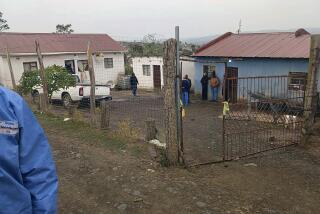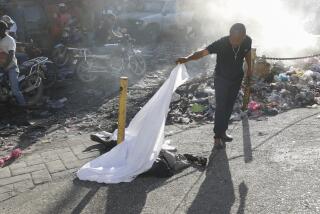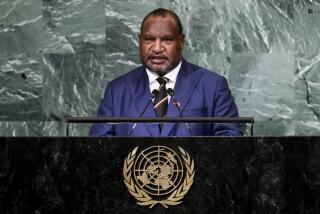Police Minister Won’t Resign, South Africa Says
- Share via
UITENHAGE, South Africa — New unrest broke out Monday in eastern Cape province, where more than 30 people have died in violence during the last week. South African President Pieter W. Botha, meanwhile, rejected calls for the resignation of his law and order minister.
Witnesses said police fired tear gas after people gathered in black townships near Uitenhage, the town in Cape province where police opened fire on a crowd of blacks last Thursday, killing at least 19. Military helicopters surveyed the area, and police roadblocks kept reporters away.
Officers with shotguns and gas masks searched buses entering and leaving the townships around Uitenhage, near Port Elizabeth. Tension remained high in the area.
National police headquarters in Pretoria reported that a shop was set afire and destroyed in a Port Elizabeth-area township and that gasoline bombs were thrown at two buses in New Brighton.
A government spokesman and a Cape Town newspaper quoted Botha as rebuffing weekend calls by the opposition for the resignation of Law and Order Minister Louis le Grange in the wake of last week’s shootings and over his handling of the police in the last year.
“It amazes me that while rioters defy and challenge the laws of the country and try to make South Africa ungovernable, and where we should stand together to repudiate such action, attacks are launched on a minister doing his duty,” Botha told the Cape Town newspaper Die Burger in defense of Le Grange.
However, in New York, the Organization of African Unity called for an urgent meeting of the U.N. Security Council to punish Botha’s government for what it called South Africa’s “wanton killings of the black majority.”
Independent estimates put the number of dead in riots this year at almost 100. Last year, more than 200 people were killed.
The government has ordered a judicial inquiry into Thursday’s shootings. Police said a small patrol was surrounded and attacked by a crowd armed with sticks and staves, while black witnesses say mourners on their way to a funeral were shot without provocation.
On Sunday, the ranking U.S. official on African affairs, Assistant Secretary of State Chester A. Crocker, registered strong objections to South Africa’s handling of its recent unrest.
Asked in a television interview whether he believes South Africa was sincere when it said it intended to negotiate with the black majority, Crocker said:
“It isn’t a question of Afrikaner or governmental intentions. If there is not constructive change, there’s going to be chaos, there’s going to be anarchy, there’s going to be a blowup.
“And that’s the key pressure for change inside that country. The white minority cannot run it with guns. They cannot run it on the basis of a labor force that is overwhelmingly black unless there is a basis of consent and dialogue and some shared values.”
However, Crocker again rejected the idea of U.S. economic sanctions against South Africa as an effective form of pressure.
“South Africa is simply not that dependent on us that we have that kind of leverage,” he said. “If we deny computer sales to South Africa, the Japanese and the Germans will fill the gap, and you can count on it.”
More to Read
Sign up for Essential California
The most important California stories and recommendations in your inbox every morning.
You may occasionally receive promotional content from the Los Angeles Times.













